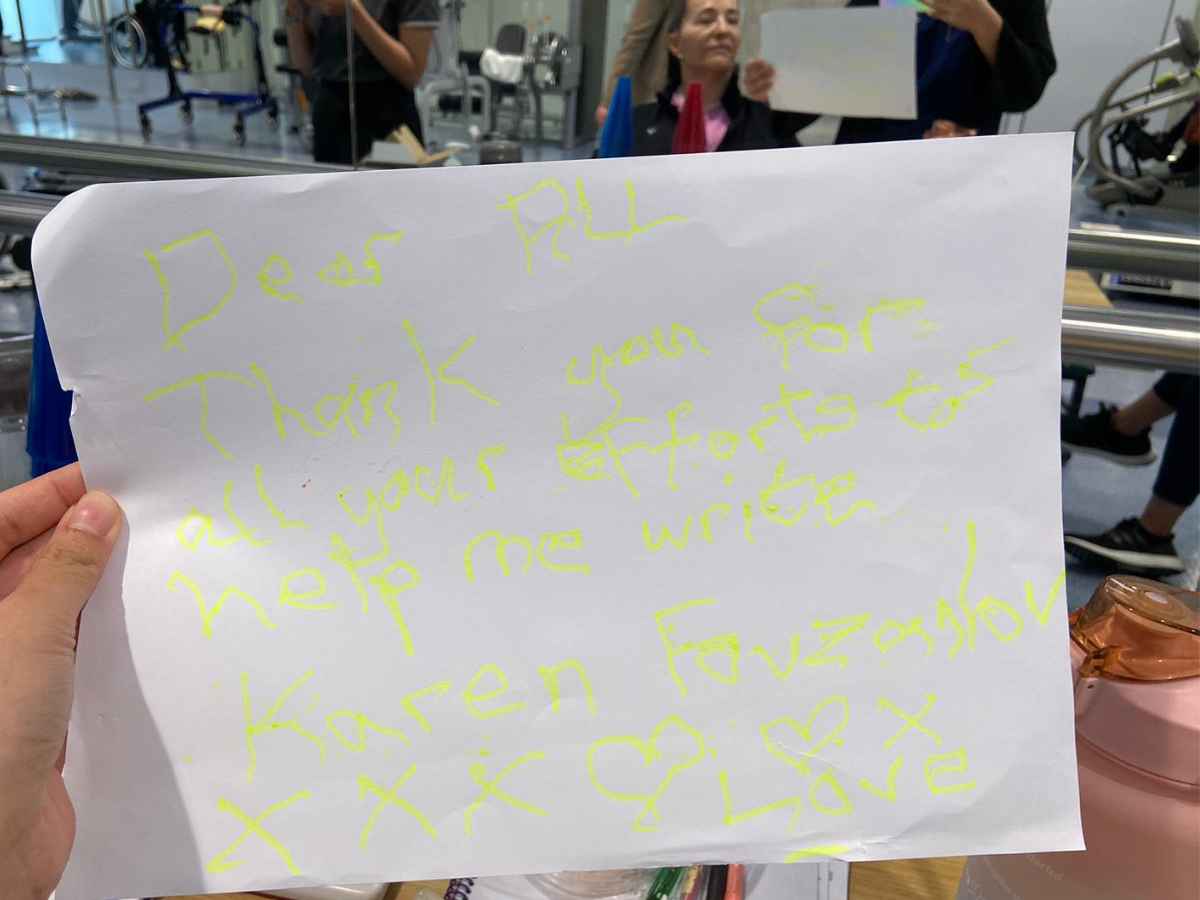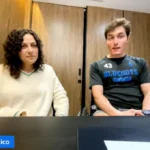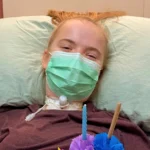Horse riding spinal cord injury is more common amongst women than spinal cord injury from other typical causes such as diving, motorcycle riding, football, and gymnastics. 50.4% of patients with this style of injury are female, one of them being Karen. She was left with a C5 level trauma following a horse riding spinal cord injury. She came to Verita Neuro Thailand in August 2022, to begin her epidural stimulation treatment program, and get a boost in her healing process.
Please could you start by introducing yourself Karen?
My full name is Karen Fouzailov and I was born in Manchester, England, but I've been living since 1898 in Israel. I was injured at the C5 level when I fell off a horse. I am an international trainer and riding competitor and I represented Israel for many, many years in international competitions. I worked as a riding trainer and it was just one ‘slip on a banana skin’ practically! I came to a stupid, small fence on the horse that I had ridden many times and also competed with abroad. It was a simple training session at home and she just stopped in front of the jump, as if she'd seen a ghost underneath it. She'd never done anything like that and I just flew off, which was very unprofessional of me and that was the start of it, that was February 2019.
How did you feel immediately after that?
I don't think I actually realized how bad it was. A friend of mine, who was also a riding trainer, was actually with me in the arena and he also was like, “Okay, get up, wipe the dust off.” I just said “I don't feel my legs, I don't feel my arms” but even when the ambulance came, I said to him “Oh, don't call my husband, he'll be too busy working, it’s fine, I’ll just go to the hospital by myself.” I really didn't realize and I think it was actually better that I didn't realize. Only as things progressed did I slowly realize how bad it was, I’m talking about a year later. It was only really as I improved, the more I realized how bad I was.
What sort of treatment did you have before you found Verita Neuro?
I did have some stem cells done in Turkey. Whether that improved or didn't improve me, I have no idea. I had physiotherapy five times a week, occupational therapy too. I even did therapeutic horse riding, aquatherapy - you name it, I did it and kept on doing it. Yes, there were very slight improvements all the time, but nothing big.
How did you find Verita Neuro in the end?
My brother-in-law is a Patent Lawyer in biology, so he knows everything that goes on everywhere. But my husband actually found it initially, he went onto Google like everybody else does and searched for ‘Spinal cord injury treatment, what is there out there?’ He heard about it straight away after my injury but he and my brother-in-law decided I shouldn’t do anything invasive in the beginning. The truth is that we’d actually been to Thailand, and we thought, you know, they eat cats and dogs, it was a bit off-putting. But then we actually heard about another Israeli girl that had actually done the treatment and after 13 years of being in a wheelchair, the year after doing the treatment, she started walking. So that was the trigger, I just said “That’s it, nothing to lose, just go and do it!” and that's how it happened.
And what made you decide to go for epidural stimulation treatment?
Because I thought that is my next best thing that could possibly get me up and walking again. From the first days, I used to tell people “I either get up and walk, or shoot me in my brain, there's absolutely nothing in between. I will not stop and accept that I will not stand up and walk again.” So as soon as I heard of that possible procedure, I just wanted to go and do it. I saw that this other girl was already standing and walking, so I thought if she can, I certainly can.
How was the experience of going to Thailand and the surgery experience?
Better than I could ever have expected. Although, I didn't know what to expect but when I got there, I was absolutely mind blown. The facilities are top of the art, the doctors, the attention to detail and the hospitality is just unbelievable. I mean, like I said, I've been to Thailand before and I know that the Thai people are very humble, just such nice people. Also, Dr. Nasir and Hanna were both very, very professional and it was just unbelievable. The nurses in the hospital, the physiotherapists, the facilities were just incredible.
When we got there, first of all we needed a COVID test. Then there was a full body scan and MRI, CT, everything, bloodwork, X rays etc. That was before the operation and then the operation was a seven hour operation. I went in smiling, came out praying and begging for morphine. It was pretty tough because I have two epidural stimulators, one in my upper body and one in my lower body, and the upper body was extremely painful. But after two days it felt better, and I had the most amazing care, the doctors were there every few hours. Whenever I rang the bell not just one nurse came, but three came into the room at once. I had everything, painkillers, whatever type of food I wanted. The care was just honestly amazing, I was just mind blown and I'm not just saying that. Just the thought of going to hospital anywhere else in the world, feels like no, no!
When we got there, first of all we needed a COVID test. Then there was a full body scan and MRI, CT, everything, bloodwork, X rays etc. That was before the operation and then the operation was a seven hour operation. I went in smiling, came out praying and begging for morphine. It was pretty tough because I have two epidural stimulators, one in my upper body and one in my lower body, and the upper body was extremely painful. But after two days it felt better, and I had the most amazing care, the doctors were there every few hours. Whenever I rang the bell not just one nurse came, but three came into the room at once. I had everything, painkillers, whatever type of food I wanted. The care was just honestly amazing, I was just mind blown and I'm not just saying that. Just the thought of going to hospital anywhere else in the world, feels like no, no!
So you feel like the team looked after you then?
Wow. Amazing. Besides the fact that they all had to have masks on and my English is more or less perfect and their English is not bad, but with their accent it can be tricky. But we quickly got used to it and they were so friendly. The physiotherapists were honestly amazing, and as you got your physiotherapy treatment, it's not that you had one physiotherapist, you had three of them! So one on the right, one on the left, if you were walking there was one running next to you with a mirror so you could see yourself walking. It was honestly amazing and just so friendly. Wherever you go, there's always somebody that's a bit miserable or a bit of a long face - here there was no one. I think they were just absolutely hand picked, the whole of the crew. Really amazing.
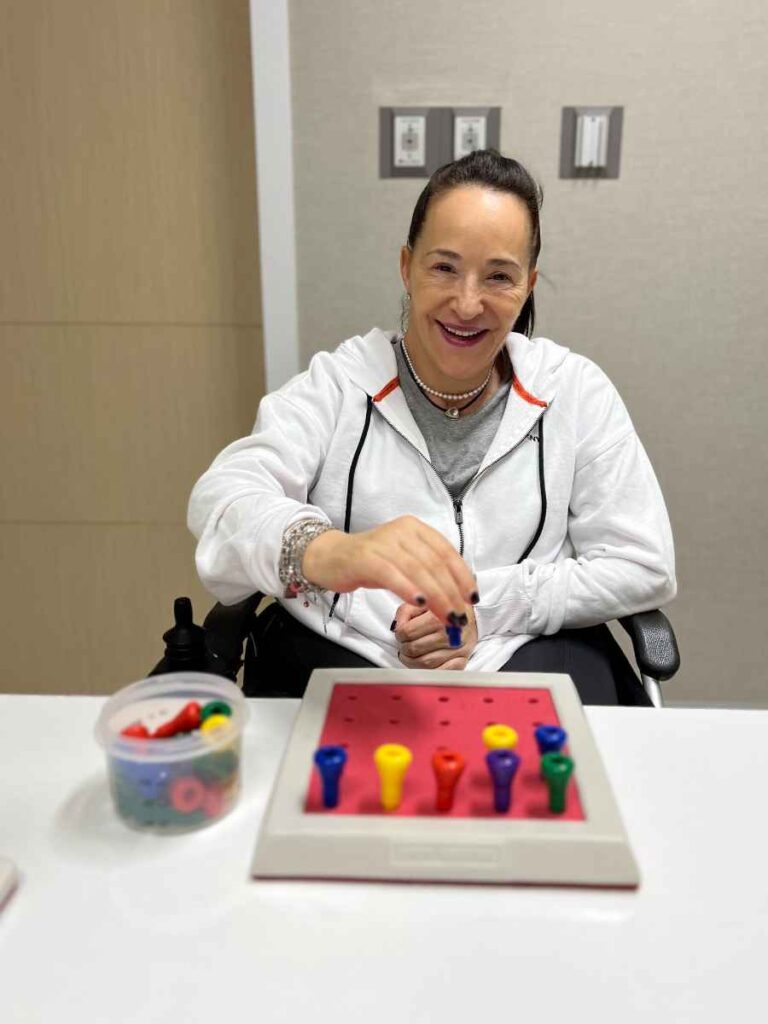
What was the recovery like after surgery?
My operation was at seven o'clock Saturday evening. I think I got back to the room around four in the morning. Obviously, I was all groggy and drugged up.Then I had two days in bed, where every six hours I was given morphine. Obviously, I had no appetite. I think on the Monday, they sent physiotherapists to the room and on Tuesday, they sent a physiotherapist to the room and by Tuesday, I was absolutely pain free. So I only had pain on the Sunday and the Monday, so 48 hours after surgery. Tuesday morning, I just felt a bit groggy and they came, they did some treatment. On Wednesday morning, I already went down to the gym and started the exercises and it was just amazing. The treatments were usually 5 hours, 9 to 11, lower body and then 11 till 12, regular physiotherapy of the whole body. Then from 12 to 2 a break, and then from 2 to 4 upper extremities and upper body. That was the routine 6 days a week.
How long did it take until you started seeing some results from that?
Basically immediately. Once I went into physiotherapy, what they actually do is called mapping and it's sort of like, if you could imagine, that you have to rewire a house. So obviously, you push this button and that will turn on the lights and that button will turn on the heater or whatever. So that's how I understood what they were doing, but when they put on the electric and the physiotherapist said to me “Okay, try and flex your heel or your ankle.” All of a sudden, my heel was flexing, it was mind blowing. Then as the days went on, of course, I could do it one or two times, and then I could do it 10 times and 12 times and then repeated sessions. Then I started doing leg kicks, even putting a ball on the floor in front of my chair and I actually managed to touch the ball and push it away! Not really a big kick, you know, I’m not joining any football team, but it was just cool to kick the ball.
I was there for two months and as time was going on, of course, I could stand longer and I could walk longer and I could push a bit stronger and everything was just improving a little bit more. Of course then there was my upper body, and all of a sudden from hands that didn't work at all, I could even grasp a marker and I even wrote. I mean, it looked like a two year old’s writing, but after not writing for 3 and a half years or so, suddenly I could write and I could grasp a spoon and not have a spoon strapped to my hand. I could grasp it and eat by myself, so it was all really mind blowing.
I was there for two months and as time was going on, of course, I could stand longer and I could walk longer and I could push a bit stronger and everything was just improving a little bit more. Of course then there was my upper body, and all of a sudden from hands that didn't work at all, I could even grasp a marker and I even wrote. I mean, it looked like a two year old’s writing, but after not writing for 3 and a half years or so, suddenly I could write and I could grasp a spoon and not have a spoon strapped to my hand. I could grasp it and eat by myself, so it was all really mind blowing.
How has life been since you got back from Thailand?
Ok, mentally I'm much more positive because I can finally start seeing a little bit of light at the end of the tunnel. My physiotherapist from Israel actually came for my last week in Thailand and joined us, so he would understand and learn the method of how to use the stimulator.
They just look like one of those old Nokia phones. You have programs A, B, and C, and on each one, you have 1 to 4. So you've got C1, C2, C3, so on and so forth, and each program is for a different movement. Even my physiotherapist, I work with my physiotherapist five days a week here, and even for him, it's mind blowing. For example, I do these bench presses, and it goes from 0, which is the easiest up to 26. In the last few months, I've gone from 0 to 14 - I can already leg press on degree 14 incline. Just so that you can understand that, when I first did it on 0 or 1, I thought “Wow, I can actually push myself!” and now I’m pushing myself on a 14 degree incline. So it's been really amazing. I'm still waiting for the day that I can actually stand up and hold my weight. I can't do it yet. Once I stand, the next thing will be to stand and take steps. I am walking in a type of walker, where my body weight is being supported and I can move my legs. It's been great, I can't wait till when I need to go back again. Because you need to get back at some point to do remapping. They're just so amazing and so professional. I was lucky that my physiotherapist joined me there because he really got to understand how to work the whole system.
They just look like one of those old Nokia phones. You have programs A, B, and C, and on each one, you have 1 to 4. So you've got C1, C2, C3, so on and so forth, and each program is for a different movement. Even my physiotherapist, I work with my physiotherapist five days a week here, and even for him, it's mind blowing. For example, I do these bench presses, and it goes from 0, which is the easiest up to 26. In the last few months, I've gone from 0 to 14 - I can already leg press on degree 14 incline. Just so that you can understand that, when I first did it on 0 or 1, I thought “Wow, I can actually push myself!” and now I’m pushing myself on a 14 degree incline. So it's been really amazing. I'm still waiting for the day that I can actually stand up and hold my weight. I can't do it yet. Once I stand, the next thing will be to stand and take steps. I am walking in a type of walker, where my body weight is being supported and I can move my legs. It's been great, I can't wait till when I need to go back again. Because you need to get back at some point to do remapping. They're just so amazing and so professional. I was lucky that my physiotherapist joined me there because he really got to understand how to work the whole system.
What are your future goals from now?
New York Marathon!! Joking, Joking. But I do actually use the New York Marathon as something to symbolize my journey and I tell people, I imagined myself like this tortoise at the start line, among loads of people and the gun fires and everyone starts running. Then here's me, this little tortoise, just taking these millimeter steps. Of course, my goals are basically to be able to stand and walk. I live in a house and luckily, our bedroom, mine and my husband's bedroom, is on the ground floor and the kids' bedrooms are upstairs. I have not been upstairs in my own house for 4 years. We have a basement that I have not been down in for 4 years. So first of all, I have plans for reorganizing my house. Also, I'm a riding trainer and I sort of stopped training because I was only concentrating on my rehab. But of course, to be a riding trainer, I want to be able to go into the arena and stand and walk around, and look around. So I would say that’s sort of my second plan. The first is just to get up, walk, and then I'm going to have a big party in my garden and invite everybody that's ever helped me in the last four years. That’s my plan, a big thank you party for everybody.
What would you say to other people with spinal injuries that haven't considered having the treatment that you've had?
Well, I do see a lot of people because in the physiotherapy center where I go, there are a lot of people. 90% are wheelchair users and 90% have spinal cord injuries. I do tell them to go, but I don't want to push it too much, only because it's very expensive. Anybody that would ask me, I would 1000% say go. Actually, Hanna gave somebody from England my phone number, whose daughter also had a riding injury. She's also a C5, wheelchair user and it happened less than a year ago. Now, she called me to ask me, and I said, absolutely, I would do it again, definitely, 1000%.
I didn't have anybody to ask, but I didn't care. It’s actually a very lonely injury. It's a very lonely world to be in a wheelchair. It’s not like breast cancer where there are support groups, and people who have breast cancer have the same disease. But with spinal cord injury, you can have nearly the same injury, but completely different symptoms. There are people with my injury level that can still walk, or people with my injury that are a lot worse than I am, so it’s different. When I first had the injury, I met this girl who had sort of an acrobatic injury and I said to her, “When you want to, let's start a support group, I really feel like I'd love to have somebody to talk to.” and she said “No, I don't want to hear anybody else's miserable story.” So, there are no support groups, not in Israel, at least.
I'm certainly glad I've had it done and I'm really looking forward to the future, and to see what the future brings. I really suggest to anyone who wants to do it, I would definitely, definitely suggest it.
I didn't have anybody to ask, but I didn't care. It’s actually a very lonely injury. It's a very lonely world to be in a wheelchair. It’s not like breast cancer where there are support groups, and people who have breast cancer have the same disease. But with spinal cord injury, you can have nearly the same injury, but completely different symptoms. There are people with my injury level that can still walk, or people with my injury that are a lot worse than I am, so it’s different. When I first had the injury, I met this girl who had sort of an acrobatic injury and I said to her, “When you want to, let's start a support group, I really feel like I'd love to have somebody to talk to.” and she said “No, I don't want to hear anybody else's miserable story.” So, there are no support groups, not in Israel, at least.
I'm certainly glad I've had it done and I'm really looking forward to the future, and to see what the future brings. I really suggest to anyone who wants to do it, I would definitely, definitely suggest it.
The above is not a verbatim transcript of Karen’s interview. Some comments have been slightly altered or re-arranged in order to improve the reading flow.

